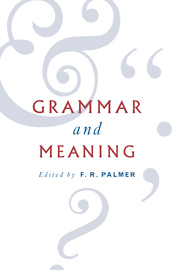Book contents
- Frontmatter
- Contents
- List of contributors
- Foreword
- 1 Polysemous relations
- 2 Fields, networks and vectors
- 3 Syntax, semantics, pragmatics
- 4 Natural-language interpretation as labelled natural deduction
- 5 Three levels of meaning
- 6 Does spoken language have sentences?
- 7 Grammaticalisation and social structure: non-standard conjunction-formation in East Anglian English
- 8 German Perfekt and Präteritum: speculations on meaning and interpretation
- 9 The possessed
- 10 Complement clauses and complementation strategies
- 11 Grammar and meaning
- John Lyons: publications
- Index
4 - Natural-language interpretation as labelled natural deduction
Published online by Cambridge University Press: 30 January 2010
- Frontmatter
- Contents
- List of contributors
- Foreword
- 1 Polysemous relations
- 2 Fields, networks and vectors
- 3 Syntax, semantics, pragmatics
- 4 Natural-language interpretation as labelled natural deduction
- 5 Three levels of meaning
- 6 Does spoken language have sentences?
- 7 Grammaticalisation and social structure: non-standard conjunction-formation in East Anglian English
- 8 German Perfekt and Präteritum: speculations on meaning and interpretation
- 9 The possessed
- 10 Complement clauses and complementation strategies
- 11 Grammar and meaning
- John Lyons: publications
- Index
Summary
It is uncontroversial that an account of semantics for natural language must provide an explanation of the information intrinsic to natural-language expressions. The assumption that such a semantics for natural language involves reconstructing the information natural-language strings convey about the non-linguistic objects they are used to describe has held sway now for some twenty years since Lewis (1972) poured scorn on the representational view of meaning then current - that of Katz (1972). However, this approach to natural-language content is far from unproblematic; and in this chapter I argue for a return to a representational approach. I advocate a proof-theoretic account of interpretation in which natural-language expressions are seen as providing the encoded input to a process of interpretation which builds structure via a process of deduction. The information an individual expression conveys is information about how to build structured configurations which constitute the interpretation of the string in which the expression is contained. The structures that result from this process are linked labelled databases set within a logic framework defining inference over complex databases. In section 1,1 set out problems for the classical form of the truth-theoretic paradigm originally advocated by Montague (1974), arguing that we need both a concept of content which underdetermines truth-theoretic content for individual expressions and a process of interpretation for strings which involves structure building. In section 2, I set out a model of utterance interpretation meeting these requirements.
- Type
- Chapter
- Information
- Grammar and MeaningEssays in Honour of Sir John Lyons, pp. 61 - 89Publisher: Cambridge University PressPrint publication year: 1995



